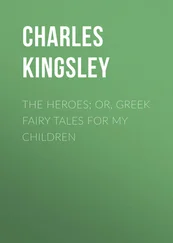Charles Kingsley - The Good News of God
Здесь есть возможность читать онлайн «Charles Kingsley - The Good News of God» — ознакомительный отрывок электронной книги совершенно бесплатно, а после прочтения отрывка купить полную версию. В некоторых случаях можно слушать аудио, скачать через торрент в формате fb2 и присутствует краткое содержание. Жанр: foreign_prose, foreign_religion, Философия, foreign_psychology, foreign_antique, на английском языке. Описание произведения, (предисловие) а так же отзывы посетителей доступны на портале библиотеки ЛибКат.
- Название:The Good News of God
- Автор:
- Жанр:
- Год:неизвестен
- ISBN:нет данных
- Рейтинг книги:4 / 5. Голосов: 1
-
Избранное:Добавить в избранное
- Отзывы:
-
Ваша оценка:
- 80
- 1
- 2
- 3
- 4
- 5
The Good News of God: краткое содержание, описание и аннотация
Предлагаем к чтению аннотацию, описание, краткое содержание или предисловие (зависит от того, что написал сам автор книги «The Good News of God»). Если вы не нашли необходимую информацию о книге — напишите в комментариях, мы постараемся отыскать её.
The Good News of God — читать онлайн ознакомительный отрывок
Ниже представлен текст книги, разбитый по страницам. Система сохранения места последней прочитанной страницы, позволяет с удобством читать онлайн бесплатно книгу «The Good News of God», без необходимости каждый раз заново искать на чём Вы остановились. Поставьте закладку, и сможете в любой момент перейти на страницу, на которой закончили чтение.
Интервал:
Закладка:
And what shall we ask?
Ask—‘Father, thy will be done on earth, as it is in heaven.’
For in asking that, we ask for the best of all things. We ask for the happiness, the power, the glory of saints and angels. We ask to be put into tune with God’s whole universe, from the meanest flower beneath our feet, to the most glorious spirit whom God ever created. We ask for the one everlasting life which can never die, fail, change, or disappoint: yea, for the everlasting life which Christ the only begotten Son lives from eternity to eternity, for ever saying to his Father, ‘Thy will be done.’
Yes—when we ask God to make us do his will, then indeed we ask for everlasting life.
Does that seem little? Would you rather ask for all manner of pleasant things, if not in this life, at least in the life to come?
Oh, my friends, consider this. We were not put into this world to get pleasant things; and we shall not be put into the next world, as it seems to me, to get pleasant things. We were put into this world to do God’s will. And we shall be put (I believe) into the next world for the very same purpose—to do God’s will; and if we do that, we shall find pleasure enough in doing it. I do not doubt that in the next world all manner of harmless pleasure will come to us likewise; because that will be, we hope, a perfect and a just world, not a piecemeal, confused, often unjust world, like this: but pleasant things will come to us in the next life, only in proportion as we shall be doing God’s will in the next life; and we shall be happy and blessed, only because we shall be living that eternal life of which I have been preaching to you all along, the life which Christ lives and has lived and will live for ever, saying to the Eternal Father—I come to do thy will—not my will but thine be done.
Oh! may God give to us all his Spirit; the Spirit by which Christ did his Father’s will, and lived his Father’s life in the soul and body of a mortal man, that we may live here a life of obedience and of good works, which is the only true and living life of faith; and that when we die it may be said of us—‘Blessed are the dead who die in the Lord; for they rest from their labours, and their works do follow them.’
They rest from their labours. All their struggles, disappointments, failures, backslidings, which made them unhappy here, because they could not perfectly do the will of God, are past and over for ever. But their works follow them. The good which they did on earth—that is not past and over. It cannot die. It lives and grows for ever, following on in their path long after they are dead, and bearing fruit unto everlasting life, not only in them, but in men whom they never saw, and in generations yet unborn.
SERMON IV
THE SONG OF THE THREE CHILDREN
O Nebuchadnezzar, we are not careful to answer thee in this matter. If it be so, our God whom we serve is able to deliver us from the burning fiery furnace; and He will deliver us out of thine hand, O king. But if not, be it known unto thee, O king, that we will not serve thy gods, nor worship the golden image which thou hast set up.
We read this morning, instead of the Te Deum, the Song of the Three Children, beginning, ‘Oh all ye works of the Lord, bless ye the Lord: praise him, and magnify him for ever.’ It was proper to do so: because the Ananias, Azarias, and Misael mentioned in it, are the same as the Shadrach, Meshech, and Abednego, whose story we heard in the first lesson; and because some of the old Jews held that this noble hymn was composed by them, and sung by them in the burning fiery furnace, wherefore it has been called ‘The Song of the Three Children;’ for child, in old English, meant a young man.
Be that as it may, it is a glorious hymn, worthy of the Church of God, worthy of those three young men, worthy of all the noble army of martyrs; and if the three young men did not actually use the very words of it, still it was what they believed; and, because they believed it, they had courage to tell Nebuchadnezzar that they were not careful to answer him—had no manner of doubt or anxiety whatsoever as to what they were to say, when he called on them to worship his gods. For his gods, we know, were the sun, moon, and planets, and the angels who (as the Chaldeans believed) ruled over the heavenly bodies; and that image of gold is supposed, by some learned men, to have been probably a sign or picture of the wondrous power of life and growth which there is in all earthly things—and that a sign of which I need not speak, or you hear. So that the meaning of this Song of the Three Children is simply this:
‘You bid us worship the things about us, which we see with our bodily eyes. We answer, that we know the one true God, who made all these things; and that, therefore, instead of worshipping them , we will bid them to worship him .’
Now let us spend a few minutes in looking into this hymn, and seeing what it teaches us.
You see at once, that it says that the one God, and not many gods, made all things: much more, that things did not make themselves, or grow up of their own accord, by any virtue or life of their own.
But it says more. It calls upon all things which God has made, to bless him, praise him, and magnify him for ever. This is much more than merely saying, ‘One God made the world.’ For this is saying something about God’s character; declaring what this one God is like.
For when you bless a person—(I do not mean when you pray God to bless him—that is a different thing)—when you bless any one, I say, you bless him because he is blessed, and has done blessed things: because he has shown himself good, generous, merciful, useful. You praise a person because he is praiseworthy, noble, and admirable. You magnify a person—that is, speak of him to every one, and everywhere, in the highest terms—because you think that every one ought to know how good and great he is. And, therefore, when the hymn says, ‘Bless God, praise him, and magnify him for ever,’ it does not merely confess God’s power. No. It confesses, too, God’s wisdom, goodness, beauty, love, and calls on all heaven and earth to admire him, the alone admirable, and adore him, the alone adorable.
For this is really to believe in God. Not merely to believe that there is a God, but to know what God is like, and to know that He is worthy to be believed in; worthy to be trusted, honoured, loved with heart and mind and soul, because we know that He is worthy of our love.
And this, we have a right to say, these three young men did, or whosoever wrote this hymn; and that as a reward for their faith in God, there was granted to them that deep insight into the meaning of the world about them, which shines out through every verse of this hymn.
Deep? I tell you, my friends, that this hymn is so deep, that it is too deep for the shallow brains of which the world is full now-a-days, who fancy that they know all about heaven and earth, just because they happen to have been born now, and not two hundred years ago. To such this old hymn means nothing; it is in their eyes merely an old-fashioned figure of speech to call on sun and stars, green herb and creeping thing, to praise and bless God. Nevertheless, the old hymn stands in our prayer-books, as a precious heir-loom to our children; and long may it stand. Though we may forget its meaning, yet perhaps our children after us will recollect it once more, and say with their hearts, what we now, I fear, only say with our lips and should not say at all, if it was not put into our months by the Prayer-book.
Do you not understand what I mean? Then think of this:—
If we were writing a hymn about God, should we dare to say to the things about us—to the cattle feeding in the fields—much less to the clouds over our heads, and to the wells of which we drink, ‘Bless ye the Lord, praise him, and magnify him for ever?’
Читать дальшеИнтервал:
Закладка:
Похожие книги на «The Good News of God»
Представляем Вашему вниманию похожие книги на «The Good News of God» списком для выбора. Мы отобрали схожую по названию и смыслу литературу в надежде предоставить читателям больше вариантов отыскать новые, интересные, ещё непрочитанные произведения.
Обсуждение, отзывы о книге «The Good News of God» и просто собственные мнения читателей. Оставьте ваши комментарии, напишите, что Вы думаете о произведении, его смысле или главных героях. Укажите что конкретно понравилось, а что нет, и почему Вы так считаете.












